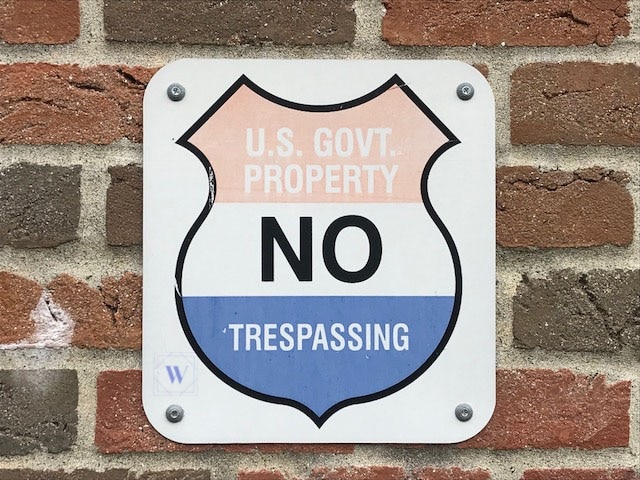Trespassing Charges
Trespassing charges can occur when an individual enters or unintentionally wanders onto someone else’s property. A property owner generally initiates the investigation – usually with a 911 call – but the criminal charge is brought against a defendant by the State of Washington (or a city, if the act occurred within city limits). Often times people do not even know that they are Trespassing until they are confronted by law enforcement, or they receive a summons in the mail weeks or months later.
For a free consultation call (360) 792-1000.

There are two degrees of Trespassing in Washington, both are misdemeanors.
The elements of the charges are as follows:
RCW 9A.52.070
Criminal trespass in the first degree
- A person is guilty of criminal trespass in the first degree if he or she knowingly enters or remains unlawfully in a building.
- Criminal trespass in the first degree is a gross misdemeanor.
RCW 9A.52.080
Criminal trespass in the second degree
- A person is guilty of criminal trespass in the second degree if he or she knowingly enters or remains unlawfully in or upon premises of another under circumstances not constituting criminal trespass in the first degree.
- Criminal trespass in the second degree is a misdemeanor.
For both of these charges, the word “enter” can mean any part of your body, or no part of your body if you are holding an item and the item is entering into the property. For example, if a person is holding a stick and they push the stick through an open window, they have “entered” the premises. The word “premises” is also used very broadly and will include any building, dwelling, structure used for commercial aquaculture, or any real property.
There Are Multiple Ways To Resolve A Trespassing Charge
Trespassing cases are handled in District and Municipal Courts, as they are misdemeanors. Being that they are handled in these “lower” Courts, there are more options regarding how to resolve a Trespassing case other than going to trial or pleading guilty.
Most jurisdictions have some form of a Pre-Trial Diversion Agreement, which is in essence a contract between the Defendant and the Prosecuting Authority. With this type of Diversion Agreement, the Court does not sentence a defendant, the Court merely approves the contract between the parties (the Defendant and the Prosecutor). If the defendant abides by the terms of the contract, the Trespassing case is typically dismissed at the end of the agreed upon term. Procedurally, the case goes onto a long continuance and then ends in a dismissal – there is never a conviction if all the terms are met.
Click here to learn more about pre-trial diversion agreements
A second option is entering into a Compromise of Misdemeanor. This happens when the defense attorney for the defendant obtains a signature from the property owner on a document that asserts that the property owner is waiving future civil litigation against the defendant and wishes that the defendant not be prosecuted. This is typically the quickest and least expensive way to have a Trespassing case be dismissed.
Click here to learn more about compromise of misdemeanor
If a defendant wishes to not resolve the matter through a Diversion or a Compromise, they always have the right to go to trial. At trial, a defendant can require the Prosecutor to prove every element of the Trespassing charge beyond a reasonable doubt.
Defenses To Trespassing
Additionally, if the case goes to trial, there are several statutory defenses to the charge of Trespassing. The defenses that can be asserted by the defendant are:
- The building was abandoned; or
- The premises, at the time of the trespass, was open to the public and the defendant complied with all lawful conditions imposed on access to or remaining in the premises; or
- The defendant reasonably believed that the owner of the premises would have let the defendant enter or remain on the property.
This is not an exclusive list of defenses for trial, but it is the “affirmative” defenses that are laid out in the statute. Other defenses, such as lack of intent, can also be argued at trial.
Witt Law Group serves individuals that have been charged with the crime of Trespassing in Kitsap, Pierce and Jefferson Counties. We also handle cases in nearly all the cities within those Counties. We have offices in Gig Harbor, Bremerton and Poulsbo for your convenience. We offer free consultations and can be reached at (360) 792-1000 (Bremerton) or (253) 312-3838 (Gig Harbor) or you can text one of our attorneys at (360) 710-0027.
If the topic of Trespassing was interesting to you, please CLICK HERE to read more similar articles in our Blog.
Criminal Defense Posts
I Was Accused Of Trespassing. What Does That Mean?

In the State of Washington, trespassing can be either civil or criminal in nature. Basically, it depends on who is bringing the cause of action. Let’s suppose you always pick blackberries on your neighbors property and you have done this for many years. One day, your neighbor is being grumpy and shouts out the window…

Get help now
Whether you choose to handle your case alone or you hire the Witt Law Group, get educated and prepared. There are so many factors that occur in the early part of your case that can dictate whether you will end up with a fair recovery. Remember that a consultation is free and worth your time. You will likely discover that the earlier you get an attorney involved in the process, the easier the transition back to normal life. Your attorney will take over all contact with the insurance adjuster and keep track of your treatment providers and bills. Your job is to heal. Our job is to present your injuries and damages to the insurance companies and argue for a fair settlement that accurately reflects the pain and damages you’ve suffered.

